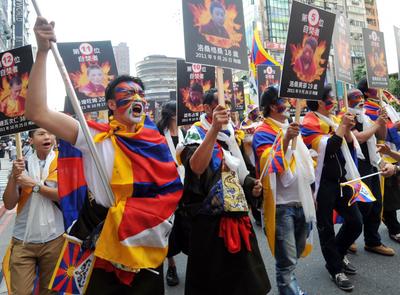Officials responded with force, shooting some protestors, and detaining and arresting thousands of people.
The March 2008 protests, known as ‘3.14’ for the date of a major riot in Lhasa, represented the greatest challenge for Communist Party authority in Tibetan areas for more than 20 years. The Chinese leadership officially blames the ‘Dalai clique’ (a derogatory term for pro-independence Tibetan exiles) and western ‘hostile forces’ for orchestrating the violence.
But this rhetoric masks a real frustration that drove many Tibetans onto the streets. It is a frustration driven by a fear that the Tibetan world is being crowded out as the Chinese state moves to secure its grip on the resource-rich plateau.
Following the events of 2008, an insecure Communist Party has used a carrot and stick approach to deal with Tibetan unrest. The Party has extended economic benefits to Tibetan communities, while demonstrating intolerance for unrest. The carrot has brought real benefits to many Tibetans. But the stick has been more deeply felt because it involves restrictions on individual liberties. Tibetans face restrictions on movement and communication. Cultural events have been cancelled to prevent people from gathering in large numbers and to restrict communication between Tibetans from different regions.
Tibetan anxieties are fuelled by the Communist Party’s determination to limit the influence of organised Tibetan Buddhism, which is seen as a competing source of authority and legitimacy. Policies limiting monastic growth and scholarly exchange as well as the increased intervention of local governments in monastic administration are widely seen as an assault on core Tibetan values and identities.
To make matters worse, Chinese media coverage of the 2008 riots led to widespread Han Chinese hostility toward ethnic Tibetans. Discrimination against Tibetans is now commonplace across China and has weakened the idea of a harmonious, multicultural society. Routine discrimination is also galvanising Tibetans’ ethnic consciousness, undermining Party efforts to integrate Tibet with China proper. Since 2008, many parts of Tibet have been under effective lockdown. The number of security personnel has been dramatically scaled up, and more than half of all government employees in many Tibetan districts now work for law enforcement agencies. The security presence might project Communist Party power, but it undermines Party rule by generating resentment and by politicising a new generation of Tibetans.
The Chinese Communist Party’s insistence that stability must come before all else has led to the emergence of local police states in many Tibetan areas. Local government leaders are told they must prevent unrest at all costs. But while physical force has suppressed demonstrations, it has given rise to a new form of protest — self-immolations. While statements left by self-immolators highlight anguish over religious freedom and cultural preservation, discontent among some groups of Tibetans extends to the economic sphere. Over the past 15 years, Beijing has invested heavily in infrastructure in Tibetan areas. While these investments have improved the livelihoods of many ethnic Tibetans, many educated Tibetans complain that the benefits of economic changes have mainly flowed to outside companies, corrupt officials and non-Tibetan migrant workers.
Despite rapid economic growth, most off-farm jobs in Tibet are in state administration. Laws preference the hiring of Tibetans for certain official positions, but a rigorous Chinese-language civil service examination disadvantages many Tibetans. There are increasing numbers of Han Chinese travelling to Tibetan areas to take local civil service examinations because they have a better chance there of securing an ‘iron rice bowl’ job than in their home areas. Tibetans who are educated in the Tibetan language have few career options, while those who are educated in the Chinese language have more opportunities, but tend to lose Tibetan literacy and Tibetan knowledge. There is now a growing divide between local Tibetan-speaking communities with Tibetan-Buddhist inspired values and a secular state with a homogenous and culturally alien view of modernisation and development.
The recent change of leadership in China presents an opportunity for the CCP to rethink its policies in Tibet. Official and public debates are already brimming with critiques of the previous administration in other policy sectors. Tibet might be next. One step in the right direction would be to allow researchers and journalists greater access to the region, as well as greater freedom for analysts to publish viewpoints that differ from the official line. Senior policy makers should no longer rely on the reports presented by local officials during their visits to Tibet.
It is clear that China’s Tibet policies need a complete overhaul for the sake of Tibetans and for the sake of China as a whole. China’s leaders need to think of new ways they can make Tibetans feel secure about their futures and comfortable with the idea that they can be simultaneously Tibetan and Chinese (citizens). This will require a dismantling of the ‘stability maintenance’ policies of the previous administration and a confrontation of the bureaucratic interests of the security apparatus. President Xi Jinping’s high standing with the armed forces and his chairmanship of the PRC Central Military Commission give him the clout to take on such interests. Fixing China’s Tibet policy could become a hallmark of the president’s leadership. A more sophisticated and tolerant approach to governing Tibet would also signal the emergence of a more humane China, ready to take its place as a leading member of the international community.
David Zhang is an independent researcher based in New York.

